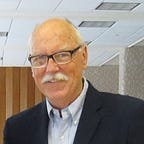Shortages? “We’ll Raise Interest Rates,” Says the Fed
We’re living in a bizarre world.
Where our political leaders endlessly discuss inflation yet most often exclude economic reality.
Yesterday the Chairman of the Federal Reserve, Jerome Powell, took center stage before the Senate Committee on Banking Housing and Urban Affairs. The testimony is part of the Senate’s oversight of The Federal Reserve. Each meeting is scheduled months in advance.
So, the first thing we should disabuse ourselves of is that this meeting was somehow the Senate’s response to the current economic crisis. Not so. Powell’s testimony was simply a bureaucratic meeting between those bureaucrats who sit at the top of the legislative bureaucracy. And the bureaucrat who presides over the Central Bank.
I’m not making this distinction to be snide. Far from it, we need a public debate about just what’s happening in our economy. But it’s essential, and I think it’s vital, that we invite the proper participants for that debate.
So who is Jerome Powell, and what role does he play in our economy? He is, I have no doubt, an eminently qualified banker. He has worked in the field for many years and is highly educated.
So what do bankers do? Bankers provide the financing for business entrepreneurs and individuals to function in our financial system. Most businesses, for instance, will go to a banker to provide funds to build and operate their business. Individuals may turn to their bank to make a significant purchase on credit. And so on.
To put it succinctly, bankers, Mr. Powell included, help enhance the demand side of our economy. They help businesses invest and individuals to make purchases.
As the chief bankers in the country, Powell and the Federal Reserve are perhaps the best control of the demand side of the economy. The Fed’s Interest Rate Policy promotes demand by lowering interest rates. And it inhibits demand by raising rates.
But here’s the problem.
Almost none of our current inflation problems come from excess demand.
They all come from the other side of the economic equation: supply. Today we have high gas prices because we don’t have enough supply. Truck drivers in Maryland this past weekend ran out of fuel because the Gas Stations were empty. High food prices are hitting, partly because of those high gas prices and crop and livestock shortages. There are also shortages: Baby formula, feminine supplies, and even my favorite hot sauce. All are in short supply.
Does the Chairman of the Federal Reserve have any answers for these supply-side issues? Of course not. That’s not his job. And we shouldn’t expect any answers from Powell concerning the supply side.
And neither should the US Senate or House of Representatives, where Powell testifies today, nor should they expect supply answers from the Fed.
Instead, if the House and Senate are genuinely concerned about this economy, they should begin talking to those who can provide the supply side answers. The farmers, grocers, and most especially the oil company executives are at the epicenter of the current economic crisis.
I think it would be especially worthwhile to invite Mike Wirth, the CEO of Chevron oil, to participate in any debate. It was Wirth who circulated the letter in response to President Biden’s letter, which squarely put the current energy shortage on the shoulders of the President.
Today there is a massive disconnect between the people who make and provide and those who regulate. We need a public debate between those responsible for delivering the goods and products we rely upon. And the bureaucrats in Washington.
And it doesn’t help when our regulators only talk to their peers across the street. When the Senate and House think that only the central bank can get us out of this inflation problem, they make a huge mistake.
The shortage is a problem that only the private sector, the working men and women of this country, can solve.
Economic News
Today in economic news. It’s day number two of Fed Chairman Powell’s testimony before Congress. The Street is not looking for any significant revelation here. However, we expect more of what we heard yesterday. An overall indication that the Fed will not act rashly. We expect the Fed to continue a more gradual rate hike rise.
The big news was that the nation’s oil stocks continued to rise overnight. The American Petroleum Institute reported that oil tank supplies rose by nearly 6 million barrels in the latest week — a total surprise. And we saw a drop in oil prices. Lower gas prices would be a welcome relief for consumers. But it raises the question, was this due to an additional supply of oil coming on line? Or to an overall slowing in oil consumption?
As we circled the globe, we’ve had five reports of the “Purchasing Manager’s Index.” The PMI is the first step in the manufacturing process. And all five have been solidly positive. We began with Japan, Australia, France, Germany, and Great Britain. All indicated that Purchasing Managers continue to “gear up” for a better tomorrow. The US reports on our Purchasing Managers later this morning, and they too are expected to show very optimistic future projections.
In earnings today, we’ve already had reports from insurance company Accenture; their stock is trading lower. Revenues from the nation’s largest restaurant chain, Darden Restaurants, the stock is unchanged, and from building supply company GMS, their stock is trading higher.
Later this afternoon, we will get results from Federal Express and software company Blackberry.
Have a great day!
David
